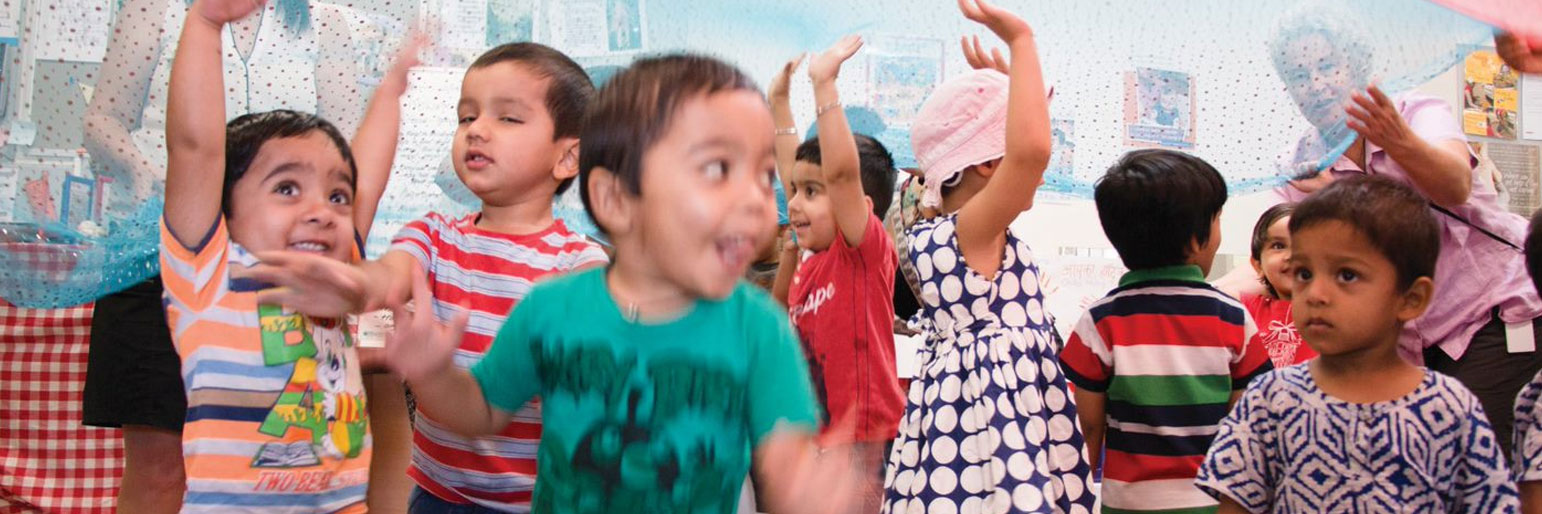Group time dancing and games
Belonging together
Playing group games creates a sense of belonging and connection with others. The opportunity to dance and engage in active play with others also encourages children’s physical movement and development of motor skills.

Activity
Adults and children come together to dance or play group games.
What you'll need
- Voice or a music player
- Copies of the song lyrics (optional)
- Large mat or clear space
- Song props eg large piece of Lycra for singing Stretchy Lycra, an empty picture frame for singing I Wonder What Your Name Is? and an empty cardboard box for singing Jack in the Box etc
Words to use
- Twirl, whirl, slide, shimmy, shake
- Roll, bop, bounce, hop, jump, gallop
- Low/high, forwards/backwards, around, together
- Front/back, side
- Beat, music, count, rhythm
- Fast/slow, quick, steady, changing, timing
- Movement, direction, position, space
- Start/finish, stop
- Arm, hand, wrist, fingers
- Leg, foot, ankle, toes
- Head, neck, shoulders
- Waist, hips, tummy
Questions to discuss
- What song or dance should we do first?
- What shall we do next?
- What’s your favourite game/dance?
Learning through play
Ways to develop numeracy through play
- Sing/play the Hokey Pokey – discuss left/right body parts.
- Play One Grey Elephant balancing on a piece of string, count as each new elephant joins the fun!
- Play What’s the Time Mr Wolf? Count the steps to match the time called by Mr Wolf.
- Try to sing and do the actions to songs like Heads and Shoulders fast and then slow (speed).
- Use positional language in group games such as Stretchy Lycra from Pukeko Stomp
Ways to develop literacy through play
- Learn the names of body parts while singing songs such as Heads and Shoulders, Dr Knickerbocker or the Hokey Pokey.
- Increase children’s vocabulary while playing games such as Duck, Duck, Goose, Here we Go Round the Mulberry Bush or Jack in the Box.
Jack is hiding down in his box...
until someone opens the lid...
BOO!! - Learn each other’s names in games such as I Wonder What Your Name Is? or Bumble Bee.
- Laugh and develop imagination with silly songs and dances such as Mister Clicketty Kane or Tofa Tafa.
Extensions and variations to this activity
- Parachute games ideas:
- Ring-a-Ring-a-Rosie
- Wheels on the Bus (walk in a circle)
- Bouncing Balls (keep your balloon the parachute)
- Row, Row, Row Your Boat (see-saw motion)
- Use a large piece of material to bring the group together asking the parents/carers to hold the fabric around the outside while the children go underneath – a see-through fabric works well as the children can still see their parents/carers. Move the fabric up and down while singing (to the tune of Frère Jacques):
Where are the children?
Where are the children?
Here they are!
Here they are!
Now it’s time for singing
Now it’s time for singing
Please sit down
Please sit down
To use this song for home time, change the 2nd verse to:
We’ve had fun at playgroup
We’ve had fun at playgroup
Bye for now
Bye for now.
Supporting parent engagement in play
Play prompts:
Ask questions, like:
- How do you say that (body part/hello/number etc) in your home language?
Parents or carers can:
- Comment on what their children are doing (say what you see)
- Talk in their home language.
- Use literacy and numeracy words (see words to use section above).
- Touch each body part on their child as you sing the words.
You can help families by:
- Modelling what you want them to do.
- Talking to them about the focus of the activity and what children might be learning.
- Writing up words that go with the activity.
- Making suggestions on what families can do at home.
- Asking parents/carers to share songs or games from other cultures.
- Asking parents/carers to sit closely with their child and join in the singing and dancing.
- Giving parents/carers copies of the song lyrics or have them typed-up and laminated.
Related Great Start activities
Great Start activities are for parents and carers to do with their children.


